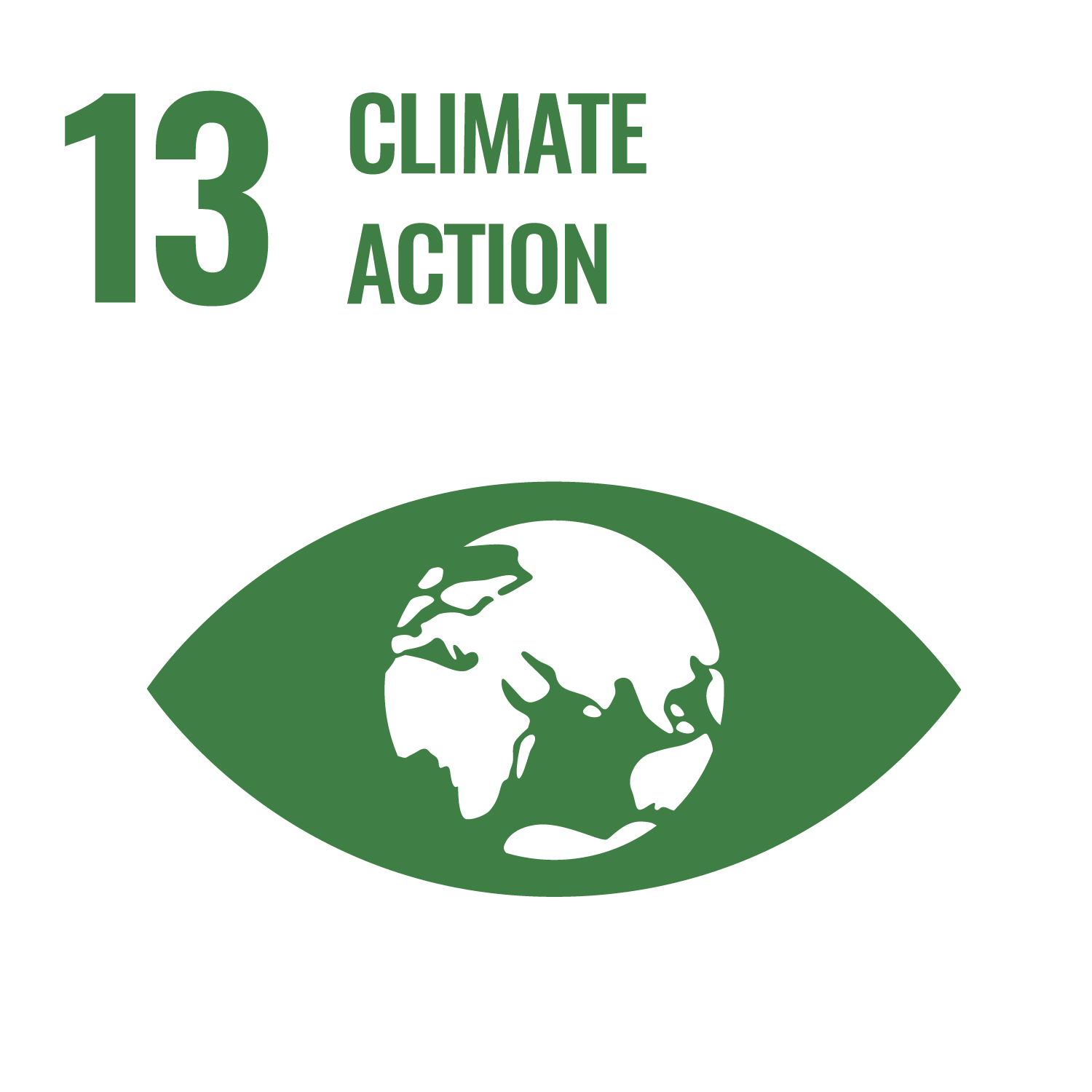 Goal 13. Climate Action
Goal 13. Climate Action
13.3.4 Inform and support government
2023-2024
At AASTMT, this indicator reflects the university’s strategic engagement with local, regional, and Arab governmental bodies to support the development of early warning frameworks, climate monitoring systems, and evidence-based disaster management policies. Through its environmental policy, educational programs, and participation in regional initiatives, AASTMT acts as a key technical partner in advancing climate resilience, greenhouse gas monitoring, and risk prevention efforts across the Arab region.
AASTMT – Egyptian ministry of Housing, Utilizes and Urban Cities protocols of Cooperation:
On the sidelines of the fourth day of the 12th World Urban Forum (WUF12), H.E. Eng. Sherif El-Sherbiny, Minister of Housing, Utilities, and Urban Communities, announced the signing of two cooperation protocols between the Ministry of Housing and the Arab Academy for Science, Technology & Maritime Transport (AASTMT). The first protocol focuses on technical consultancy in New Alamein City, developing a comprehensive proposal for managing marine and coastal resources of the city’s beach and artificial lake. The first covers technical consultancy for New Alamein City, developing integrated management of marine and coastal resources and embedding monitoring & early-warning tools in urban planning. Demonstrates direct institutional support to a government entity for climate-risk and environmental-monitoring systems.
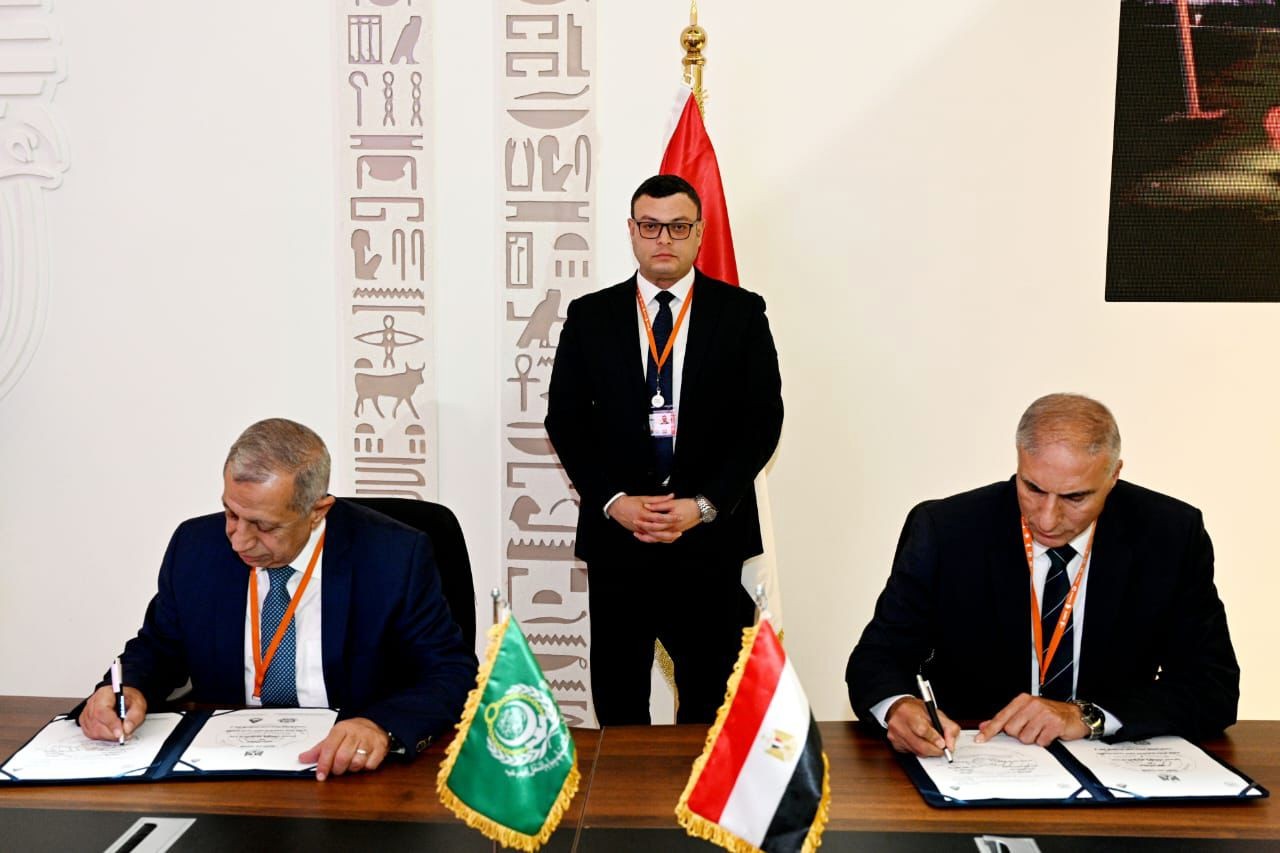
AASTMT–Ministry of Environment Partnership for Land Sustainability, Waste Recycling, and Climate Action 26 Oct, 2024:
The Minister of Environment met with the President of AASTMT to enhance joint environmental cooperation and advance sustainability initiatives. Plans include establishing a Climate Change Information Center, launching AI-based applications to reduce carbon emissions and plastic waste, and promoting green industry through waste recycling. In alignment with SDG 15 (Life on Land), these initiatives support ecosystem protection, land sustainability, and responsible resource use.
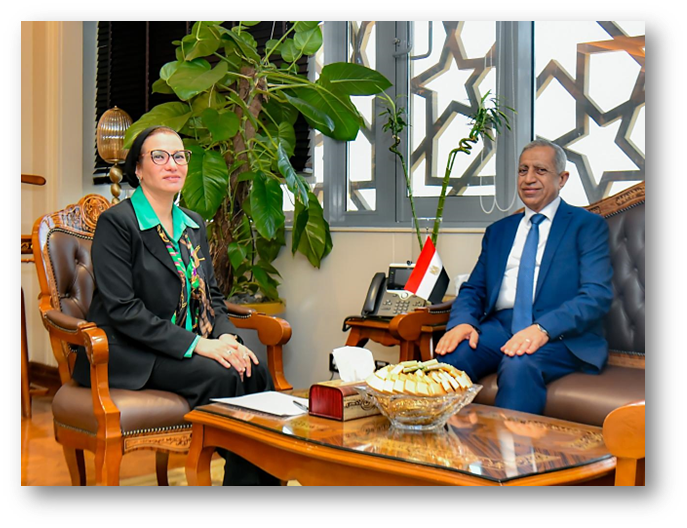
AASTMT Urban Planning Innovations Take Center Stage at World Urban Forum 12 (WUF12) (07 Nov 2024):
The Arab Academy for Science, Technology & Maritime Transport (AASTMT) presented innovative approaches to sustainable urban planning, land-resource management, and ecosystem restoration. Through academic sessions and student projects, AASTMT emphasized the integration of environmental sustainability, land-use efficiency, and green infrastructure in city development. This participation directly supports SDG 15.2.1 by promoting sustainable land management, protection of terrestrial ecosystems, and the restoration of degraded areas within urban contexts.
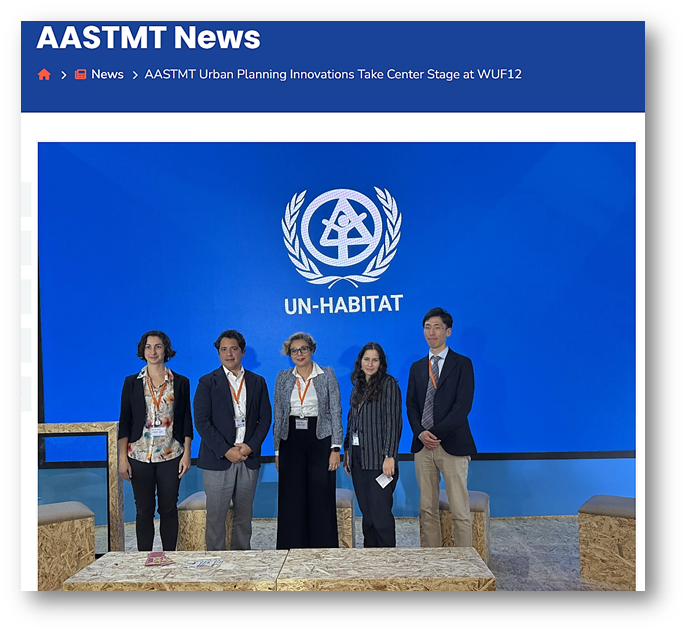
Activities of the Arab Day for Disaster Risk Reduction in 2024:
On 4 April 2024, the Arab Academy for Science, Technology & Maritime Transport (AASTMT), in collaboration with the League of Arab States’ Housing, Water Resources and Disaster Reduction Administration, convened the “Activities of the Arab Day for Disaster Risk Reduction 2024.” The workshop focused on pressing climate-change and disaster-risk issues in the Arab region — including sea-level rise, water-resource threats, gas-emission and climate-change scenarios, and crisis/disaster management in the maritime and agricultural sectors. The event featured two main sessions: one on coastal and sea-level risks and another entitled “Crisis and Disaster Management in Arab Countries – Challenges and Contemporary Issues.” AASTMT’s President, Prof. Ismail Abdel Ghaffar, opened the workshop, which brought academia, government and regional stakeholders together to enhance resilience in the face of evolving hazards.
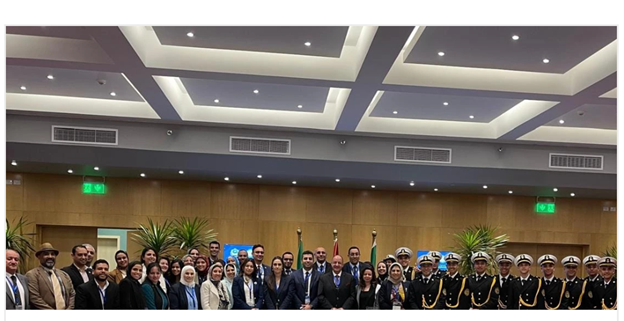
PRIMA Annual Work Plan (AWP) for the year 2024:
On February 14th 2024, an awareness Info-day was held at AASTMT on the Preliminary Version of the PRIMA Annual Work Plan (AWP) for the year 2024 which has been officially released by the PRIMA Secretariat. It is worth noting that the PRIMA program is a funding program provided by the European Union to conduct scientific research in various technology fields such as Water Management, Farming Systems, Agri-Food Value Chain, Energy and Water, energy, food and ecosystems (WEFE) Nexus sectors. Research teams are not limited only to universities and research centers, but all legal entities can apply, whether they are government agencies, SMEs, NGOs, the private sector, companies. PRIMA’s focus on water management, drought prediction, and the WEFE nexus inherently strengthens regional climate-risk monitoring and early-warning capacities, particularly for water-related disasters.
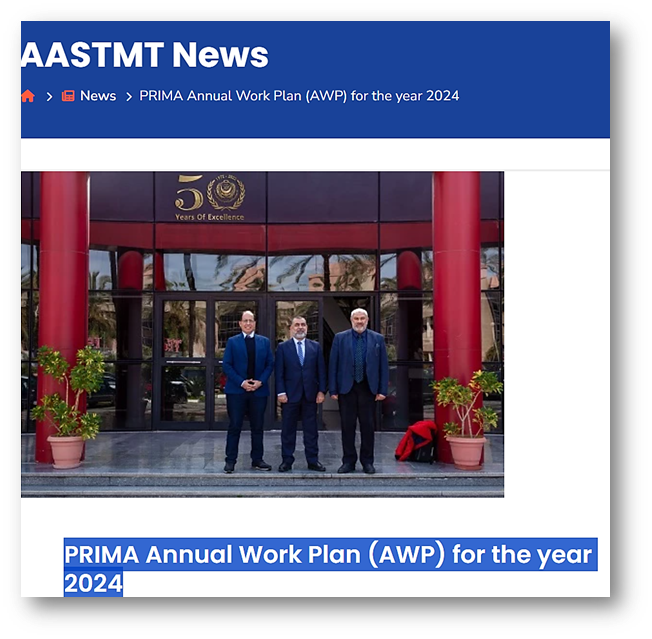
Promoting Green Competences for Integrated Sustainable Development in Architectural Education through Experiential, Lab-based, Active Learning:
This is an educational and capacity-building project focused on developing green competences, sustainable architecture, and active learning methodologies likely within universities and possibly in cooperation with public stakeholders. The project contributes to climate action through education, innovation, resilience building, and sustainability in architecture promoting adaptation, resilience, and mitigation competencies.
It aligns with climate capacity building.
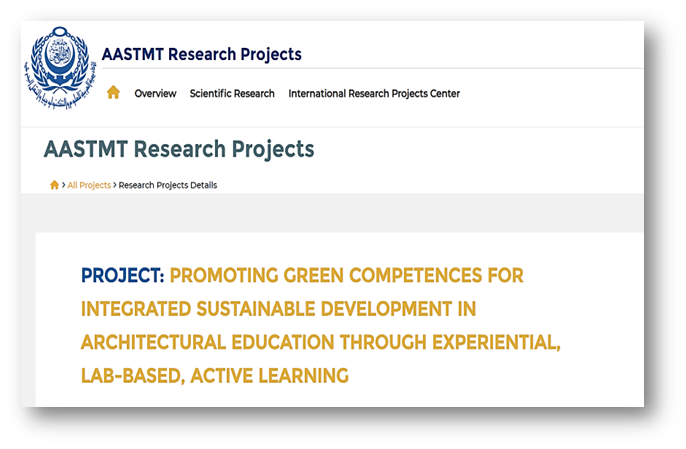
AASTMT Partnership in the RURALITIES Project to Support Climate-Smart Rural Governance and Early-Warning Capacity:
AASTMT continued its active partnership in the Horizon Europe project “RURALITIES – Climate Smart, Ecosystem-Enhancing and Knowledge-Based Rural Expertise and Training Centres” (Grant Agreement No. 101060876). Through this consortium, AASTMT serves as a key beneficiary partner supporting the development of climate-resilient rural innovation hubs and the training of local and regional authorities in climate-risk monitoring, early-warning, and adaptation planning. The project coordinates actions among governments, research institutions, and regional stakeholders in both the EU and African Union, enhancing data-driven decision-making and climate disaster preparedness across rural and coastal communities. AASTMT’s contribution focuses on capacity-building, policy support, and digital dissemination for rural climate governance in Egypt and North Africa.
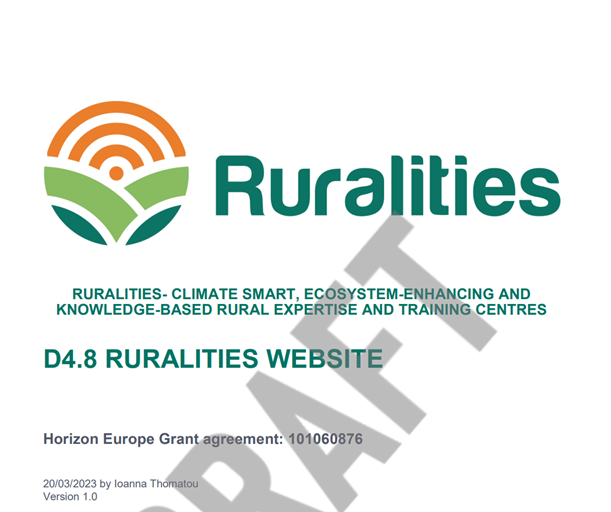
Environmental Monitoring and Climate Change Laboratory:
The Environmental Monitoring & Climate Change Laboratory (EMCCL) at the Arab Academy for Science, Technology & Maritime Transport (AASTMT) serves as a regional hub for climate and environmental data collection, analysis, and modelling. The laboratory provides advanced technical capabilities in meteorological monitoring, air-quality assessment, coastal ecosystem observation, and climate-impact modelling, all of which directly contribute to early-warning and monitoring systems for climate-related risks. AASTMT’s Environmental Monitoring & Climate Change Laboratory (EMCCL) supports local and regional authorities in monitoring environmental changes, forecasting climate-related hazards, and developing effective response strategies.
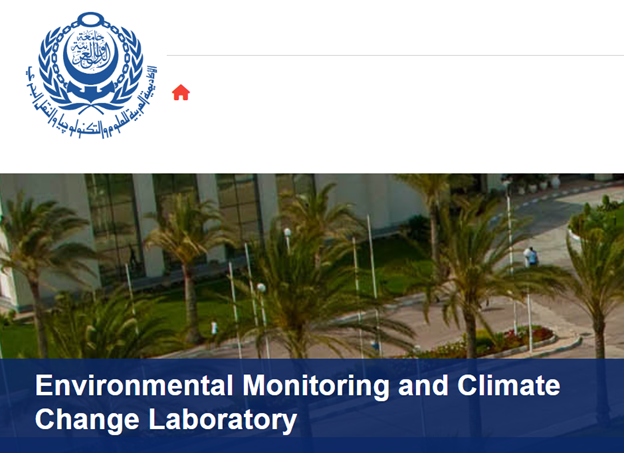
AASTMT Climate Action Plan_2024:
The Arab Academy for Science, Technology and Maritime Transport (AASTMT) launched its Climate Action Plan 2024 as a comprehensive roadmap to achieve. The plan focuses on reducing greenhouse gas (GHG) emissions, lowering the carbon footprint of campus operations, and promoting climate change mitigation and adaptation strategies across all branches. Key priorities include implementing renewable energy systems, advancing energy efficiency initiatives, integrating climate resilience into campus infrastructure. The plan also supports climate-smart innovation, CO₂ emission tracking, and environmental impact assessment.
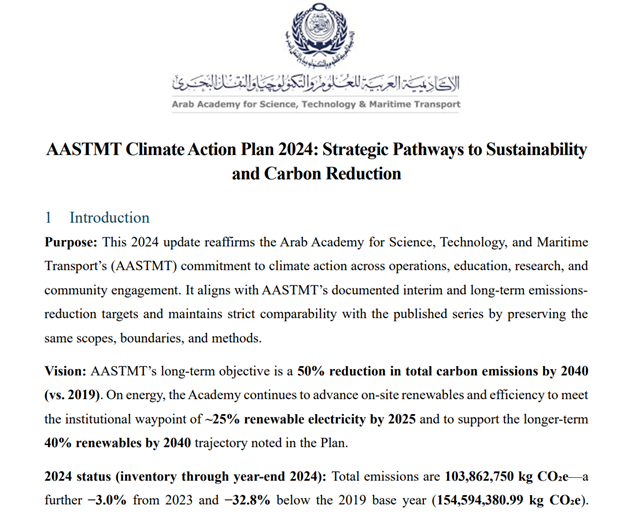
Artificial Intelligence for Sustainability Workshop:
The Sustainable Development and International Cooperation Administration is organizing a workshop on "Artificial Intelligence for Sustainability" under the patronage of His Excellency Mr. Ahmed Aboul Gheit, Secretary-General of the Arab League, and His Excellency Professor Ismail Abdelghafar Ismail Farag, President of the Arab Academy for Science, Technology and Maritime Transport. The Arab League will be hosting the workshop at its headquarters, with the aim of enhancing the Arab concept of sustainability through artificial intelligence. The workshop aims to shed light on how technology and artificial intelligence can be used to promote environmental, economic, and social sustainability.
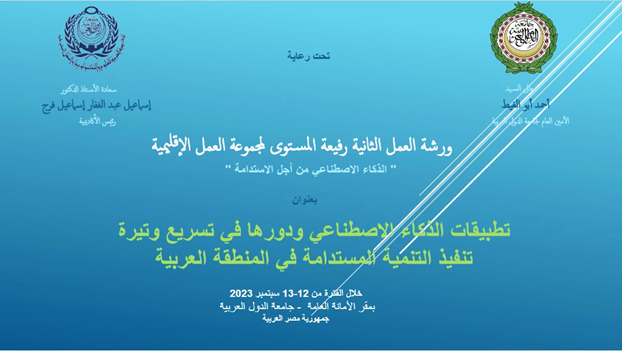
2022-2023
The Arab Academy for Science, Technology, and Maritime Transport (AASTMT) actively collaborates with local and regional governments to address climate change disasters through early warning systems and climate risk monitoring. By leveraging expertise in climate science, meteorology, and disaster preparedness, AASTMT equips governments with critical tools to mitigate the effects of global warming, greenhouse gas emissions, and extreme weather events.
Through initiatives such as the Meteorology Course, Climate Action Plan, and regional workshops, AASTMT provides technical support, data-driven insights, and innovative solutions for enhancing disaster preparedness and resilience. These efforts include developing early warning mechanisms for sea-level rise, CO2 emissions monitoring, and the impacts of climate warming on vulnerable communities. AASTMT’s commitment to collaborative adaptation strengthens regional climate policies, enhances carbon footprint reduction efforts, and fosters sustainable development partnerships.
By integrating advanced climate risk management practices into government operations, AASTMT ensures that public authorities are well-prepared to address climate-induced risks and promote climate resilience in alignment with global goals.
Meteorology Course at AASTMT: Building Capacity for Climate Risk Monitoring and Early Warning Systems
The Meteorology Course at AASTMT equips students with critical skills for monitoring climate risks and managing early warning systems. By covering climate change patterns, CO2 emissions, and extreme weather forecasting, the course supports local and regional governments in disaster preparedness and mitigation efforts. Graduates are trained to provide technical expertise for early warnings, enhancing community resilience and informing government strategies for climate-induced risks. This initiative underscores AASTMT’s commitment to climate risk reduction and cooperative planning for climate resilience.

AASTMT Climate Action Plan (CAP): A Key Strategy for Climate Risk Monitoring and Disaster Preparedness
The AASTMT Climate Action Plan (CAP) is a comprehensive strategy designed to inform and support governments in climate change adaptation and disaster preparedness. It integrates early warning systems, climate risk monitoring, and disaster management practices to reduce CO2 emissions, promote renewable energy, and enhance sustainability. CAP fosters collaboration with local governments and organizations, providing critical data and expertise to strengthen climate resilience in vulnerable regions.

For more details on AASTMT's Climate Action Plan, visit the link.
Master of Science Degree in Smart Environmental Management of Climate Change (SECCM): Enhancing Climate Risk Monitoring and Early Warning Systems
The Master of Science Degree in Smart Environmental Management of Climate Change (SECCM) offered by AASTMT equips students with advanced expertise in climate risk monitoring, CO2 reduction strategies, and disaster preparedness. Graduates gain skills in early warning systems and climate data analysis, enabling them to inform and support governments in addressing climate change impacts. This program fosters collaboration between AASTMT and local or regional authorities to enhance resilience against climate-induced disasters.

For further details on the SECCM program, visit the link.
Germany to Egypt Workshop on Meteorology and Environmental Studies: Advancing Climate Risk Monitoring and Early Warning Systems
The Germany to Egypt Workshop on Meteorology and Environmental Studies, hosted by AASTMT, focused on advancing skills in climate risk monitoring and early warning systems. Participants were trained in using meteorological tools to analyze climate patterns, assess the impact of sea-level rise, and predict extreme weather events. This workshop directly supports local and regional governments by enhancing their disaster preparedness and informing decision-making on climate risk reduction and CO2 emissions mitigation.

For more information about the workshop, visit the link.
Strengthening Local and Regional Climate Action Through Collaborative Waste Management
AASTMT collaborates with local and regional governments to enhance climate action through sustainable waste management. By leading training courses across 27 governorates and enabling independent landfill operations, AASTMT supports emission reduction, climate adaptation, and disaster preparedness. These initiatives strengthen local governments’ capacity to mitigate climate risks and manage CO2 emissions, contributing to enhanced climate resilience.

For detailed insights into this collaboration, visit the link.
AASTMT President's Participation in the International Workshop on the Impact of Climate Change on Coastal Cities: Enhancing Disaster Preparedness for Coastal Resilience
AASTMT’s President participated in the International Workshop on the Impact of Climate Change on Coastal Cities, focusing on disaster preparedness and enhancing resilience against risks such as sea-level rise and extreme weather events. The workshop emphasized the importance of early warning systems and collaborative strategies to mitigate climate-related impacts on vulnerable coastal regions. AASTMT’s contributions support governments by providing expertise and insights into effective climate risk monitoring and disaster management.

For further details about the workshop, visit the link.
15th Sectoral Cooperation Meeting on Climate Change between the League of Arab States and the United Nations: Addressing Climate Risk Monitoring and Disaster Preparedness
AASTMT actively participated in the 15th Sectoral Cooperation Meeting on Climate Change between the League of Arab States and the United Nations, focusing on climate risk monitoring and disaster preparedness. The discussions addressed key issues such as drought management, desertification, and the development of early warning systems to protect vulnerable communities. AASTMT’s contributions support governments by providing expertise and strategies to enhance climate resilience and inform regional climate policies.

For more details, refer to the link.
Alexandria Workshop on Weather Routing and Carbon Emissions Reduction: Supporting Climate Risk Monitoring and Early Warning Systems
AASTMT organized the Alexandria Workshop on Weather Routing and Carbon Emissions Reduction, focusing on using weather routing techniques to enhance climate risk monitoring and reduce maritime carbon emissions. The workshop trained participants in analyzing weather charts and climate data, contributing to the development of early warning systems for extreme weather events. These efforts demonstrate AASTMT's role in supporting governments and local authorities in disaster preparedness and sustainable maritime operations.

For more details, refer to the Link.
Crisis Management Course: Building Skills for Climate Disaster Preparedness and Risk Assessment
AASTMT's Crisis Management Course equips participants with essential skills for climate disaster preparedness and risk assessment. The course focuses on emergency planning, damage control, and the development of strategies to address climate-induced crises such as extreme weather events and CO2 emissions. By training professionals to collaborate with governments and community organizations, the course supports local and regional disaster response efforts and strengthens early warning systems for climate risks.

For more details, refer to the link
AASTMT Hosts African Development Senior Managers Forum on Climate Change and Transport Resilience: Strengthening Disaster Preparedness in Africa’s Transport Sector
AASTMT hosted the African Development Senior Managers Forum on Climate Change and Transport Resilience to address the challenges of climate-induced risks in Africa's transport sector. The forum focused on disaster preparedness strategies for critical infrastructure, including mitigation of CO2 emissions, rising sea levels, and extreme weather events. By fostering collaboration between policymakers, transport authorities, and climate experts, AASTMT supports local and regional governments in developing early warning systems and resilient transport systems.

For more details, refer to the link.
Science Diplomacy Workshop: "Climate Change in the Broader Mediterranean Area": Collaborative Approaches to Disaster Preparedness and Climate Risk Monitoring
The Science Diplomacy Workshop on "Climate Change in the Broader Mediterranean Area" focused on disaster preparedness and climate risk monitoring, addressing challenges such as rising sea levels, biodiversity loss, and extreme weather events. By promoting collaborative planning among climate experts, AASTMT supports local and regional governments in developing early warning systems and climate adaptation strategies to mitigate risks and protect vulnerable communities.

For further details, refer to the link.
Strategic Ocean Alliance Forum at COP28: Enhancing Marine Resilience and Disaster Preparedness in the Maritime Sector:
The Strategic Ocean Alliance Forum at COP28 brought together regional and international experts to address climate change impacts on marine ecosystems and disaster preparedness in the maritime sector. AASTMT actively supported discussions on enhancing marine resilience, developing early warning systems, and informing governments about sustainable strategies to mitigate risks like rising sea levels and extreme weather. This initiative reinforces AASTMT's role in supporting local and regional governments in climate risk monitoring and disaster response.

For further details, refer to the link.
AASTMT Advocates for Climate Resilience and Sustainability at Mediterranean Ports & Shipping Summit
At the Mediterranean Ports & Shipping Summit, AASTMT advocated for climate resilience and sustainable practices in maritime transport. The discussions emphasized adapting logistics and port operations to address climate change risks such as rising sea levels and extreme weather. AASTMT's participation highlighted its commitment to informing and supporting local and regional governments in developing early warning systems and climate risk monitoring for disaster preparedness in the maritime sector.

For more details, refer to the link.
Webinar on Climate Change Mitigation in the Shipping and Maritime Industry: Enhancing Government Preparedness and Climate Risk Monitoring
The Webinar on Climate Change Mitigation in the Shipping and Maritime Industry, organized by AASTMT in collaboration with MTCC Africa and REMPEC, focused on reducing greenhouse gas emissions and enhancing energy efficiency in maritime operations. It emphasized supporting local and regional governments with climate risk monitoring and disaster preparedness strategies for the maritime sector. By sharing tools and best practices, the webinar contributed to developing early warning systems and informed government efforts to address climate-induced risks in the shipping industry.
2021 -2022
In its strategic approach to Sustainable Development Goal 13, focusing specifically on Climate Action, the Arab Academy for Science, Technology & Maritime Transport (AASTMT) has actively engaged in informing and supporting both local and regional governments in the areas of climate change disaster early warning and monitoring. This engagement is critical in fostering collaborative efforts between educational institutions and governmental bodies to enhance climate resilience and preparedness.
AASTMT’s initiatives under Indicator 13.3.4 demonstrate a strong commitment to bridging the gap between academic research, policy-making, and practical implementation in the realm of climate change and environmental sustainability. The following activities highlight AASTMT’s efforts in this domain:
Launch of the Al-Akhdar Project for Arab Youth at AASTMT Smart Village
The “Arab Youth Green Venture Project” was inaugurated under the patronage of Dr. Ismail Abdul Ghafar Ismail Faraj, President of AASTMT. This initiative, held in the presence of Assistant Minister for Environmental Policy Dr. Shirin Fikri, signifies AASTMT’s participation in the “Atharz for the Green” initiative launched by Egypt’s Ministry of Environment. This aligns with Egypt’s hosting of COP27 and the national strategy “Egypt 2030” for sustainable development.
Arab Youth Green Venture:
Originating from AASTMT’s Smart Village campus, the “AASTIANS Go Green” initiative has been a continuous effort since 2020 to promote environmental awareness and engage the community in green activities. This project underscores AASTMT’s social responsibility and complements the cooperation agreement with Major General Mahmoud Shaarawy, Minister of Local Development, and Professor Dr. Ismail Abdel Ghaffar Ismail, AASTMT President. The project’s launch, attended by Assistant Minister of Environment Dr. Sherin Fikry, included an exhibition of environmental protection projects, a sports marathon with the theme "AASTIANS Go Green," and various student-centric activities. These initiatives are part of the “Prepare for Green” environmental initiative under the patronage of President Abdel Fattah El-Sisi.
Through these initiatives, AASTMT has not only contributed to the academic discourse on climate change but has also played an instrumental role in supporting governmental efforts to enhance climate change preparedness and response. Our active participation in these projects reflects our dedication to creating a sustainable future and our commitment to supporting government bodies in their endeavors to combat climate change and its impacts.
Arab-Youth-Green-Venture on the AASTMT news page




